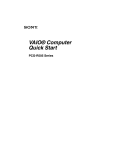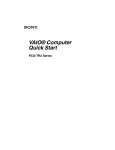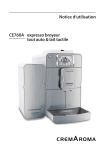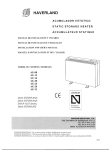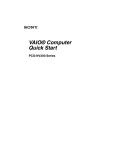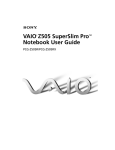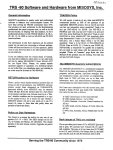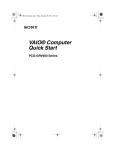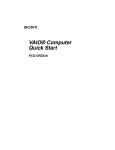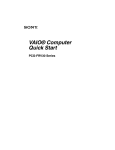Download Sony PCG-R505GL Quick Start Manual
Transcript
VAIO® Computer Quick Start PCG-R505 Series Notice to Users ............................................5 Setting Up ..................................................15 Unpacking Your Computer .......................................16 Applying Ergonomics ...............................................18 Locating Controls and Ports ......................................19 Locating Docking Station Controls and Ports...........24 Connecting the Docking Station ...............................26 Disconnecting the Docking Station...........................27 Getting Started ..........................................31 Turning On Your Computer ......................................32 Using the Touch Pad .................................................35 Registering Your Computer ......................................36 Locating Your VAIO Computer User Guide ............37 Setting Up A Dial-Up Connection ............................39 Turning Off Your Computer .....................................41 Expanding Your Computing Power .........43 Upgrading Memory ...................................................44 Locating Preinstalled Programs ................................44 Using the Recovery CDs...........................45 Application and System Recovery CDs ....................46 Using Your Recovery CDs........................................46 3 VAIO® Computer Quick Start Caring for Your Computer........................51 Storing Your Computer ............................................ 52 Using Cables and Connections ................................. 52 Cleaning Your Computer.......................................... 53 Handling the LCD Screen......................................... 53 Troubleshooting........................................55 Troubleshooting Your Computer.............................. 56 Troubleshooting the LCD Screen ............................. 60 Troubleshooting the Mouse and Touch Pad ............. 60 Troubleshooting the Docking Station ....................... 62 Support Options ........................................................ 63 Program Support Information ................................... 64 Index...........................................................67 4 Notice to Users © 2002 Sony Electronics Inc. All rights reserved. This manual and the software described herein, in whole or in part, may not be reproduced, translated, or reduced to any machine-readable form without prior written approval. SONY ELECTRONICS INC. PROVIDES NO WARRANTY WITH REGARD TO THIS MANUAL, THE SOFTWARE, OR OTHER INFORMATION CONTAINED HEREIN AND HEREBY EXPRESSLY DISCLAIMS ANY IMPLIED WARRANTIES OF MERCHANTABILITY OR FITNESS FOR ANY PARTICULAR PURPOSE WITH REGARD TO THIS MANUAL, THE SOFTWARE, OR SUCH OTHER INFORMATION. IN NO EVENT SHALL SONY ELECTRONICS INC. BE LIABLE FOR ANY INCIDENTAL, CONSEQUENTIAL, OR SPECIAL DAMAGES, WHETHER BASED ON TORT, CONTRACT, OR OTHERWISE, ARISING OUT OF OR IN CONNECTION WITH THIS MANUAL, THE SOFTWARE, OR OTHER INFORMATION CONTAINED HEREIN OR THE USE THEREOF. Sony Electronics Inc. reserves the right to make any modification to this manual or the information contained herein at any time without notice. The software described herein is governed by the terms of a separate user license agreement. This product contains software owned by Sony and licensed by third parties. Use of such software is subject to the terms and conditions of license agreements enclosed with this product. Some of the software may not be transported or used outside the United States. Software specifications are subject to change without notice and may not necessarily be identical to current retail versions. Updates and additions to software may require an additional charge. Subscriptions to online service providers may require a fee and credit card information. Financial services may require prior arrangements with participating financial institutions. As an ENERGY STAR® Partner, Sony Corporation has determined that this product meets the ENERGY STAR® guidelines for energy efficiency. The International ENERGY STAR® Office Equipment Program is an international program that promotes energy saving through the use of computers and other office equipment. The program backs the development and dissemination of products with functions that effectively reduce energy consumption. It is an open system in which business proprietors can participate voluntarily. The targeted products are office equipment such as computers, displays, printers, facsimiles and copiers. Their standards and logos are uniform among participating nations. ENERGY STAR is a U.S. registered mark. 5 VAIO® Computer Quick Start The Wireless LAN PC card, which is incorporated into selected models only, has passed WiFi certification and complies with the interoperability specifications established by WECA (Wireless Ethernet Compatibility Alliance). Sony, DVgate, Handycam, i.LINK, Mavica, MagicGate™ Memory Stick , Memory Stick , MovieShaker, VAIO, and the VAIO logo are trademarks of Sony Corporation. Microsoft, Windows Media, Windows, Windows NT, and the Windows logo are registered trademarks of Microsoft Corporation. Intel, SpeedStep, and Pentium are trademarks or registered trademarks of Intel Corporation. PS/2 is a registered trademark of IBM. Acrobat Reader, Photoshop, Photoshop Elements, and Premiere are trademarks of Adobe Systems Incorporated. PowerPanel is a trademark of Phoenix Technologies Ltd. MEMORY STICK TM This product incorporates copyright protection technology that is protected by method claims of certain U.S. patents and other intellectual property rights owned by Macrovision Corporation and other rights owners. Use of this copyright protection technology must be authorized by Macrovision Corporation, and is intended for home and other limited viewing uses only unless otherwise authorized by Macrovision Corporation. Reverse engineering or disassembly is prohibited. i.LINK is a trademark of Sony used only to designate that a product contains an IEEE 1394 connection. The 6 i.LINK connection may vary, depending on the software applications, operating system, and compatible i.LINK devices. All products with an i.LINK connection may not communicate with each other. Please refer to the documentation that came with your compatible i.LINK device for information on operating conditions and proper connection. Before connecting compatible i.LINK PC peripherals to your system, such as a CD-RW or hard disk drive, confirm their operating system compatibility and required operating conditions. All other trademarks are trademarks of their respective owners. Microsoft note Certain software product(s) included with this computer may include features such as copy protection and content management technology. Use of the software product(s) requires agreement to applicable end user agreements and full compliance with applicable product activation procedures. Product activation procedures and privacy policies will be detailed during initial launch of the software product(s), or upon certain reinstallations of the software product(s) or reconfiguration of the computer, and may be completed by Internet or telephone (toll charges may apply). Owner’s Record The model number and serial number are located on the bottom of your Sony VAIO computer. Refer to the model and serial number when you call your Sony Service Center. Model Number: PCG-652L Serial Number:________________________ Notice to Users Safety Information . WARNING ❑ To prevent fire or shock hazard, do not expose your computer to rain or moisture. ❑ To avoid electrical shock, do not open the cabinet. Refer servicing to qualified personnel only. ❑ Never install modem or telephone wiring during a lightning storm. ❑ Never install telephone jacks in wet locations unless the jack is specifically designed for wet locations. ❑ Never touch uninsulated telephone wire or terminals unless the telephone line has been disconnected at the network interface. ❑ Use caution when installing or modifying telephone lines. ❑ Avoid using the modem during an electrical storm. ❑ Do not use the modem or a telephone to report a gas leak in the vicinity of the leak. ❑ A socket outlet should be as close as possible to the unit and easily accessible. ❑ i.LINK, PC Card, and USB connectors are not supplied with Limited Power Sources To change the backup battery, please contact your nearest Sony Service Center. Caution: The use of optical instruments with this product will increase eye hazard. As the laser beam used in this product is harmful to the eyes, do not attempt to disassemble the cabinet. Refer servicing to qualified personnel only. (For CD-RW/DVD Combo Drive, CD-ROM drive, DVD-ROM drive) Danger: Visible and invisible laser radiation when open. Avoid direct exposure to beam. Caution: To reduce the risk of fire, use only No. 26 AWG or larger telecommunication line cord. AVERTISSEMENT ❑ Pour prévenir tout risque d’incendie ou d’électrocution, garder cet appareil à l’abri de la pluie et de l’humidité. ❑ Pour prévenir tout risque d’électrocution, ne pas ouvrir le châssis de cet appareil et ne confier son entretien qu’à une personne qualifiée. ❑ Ne jamais effectuer l’installation de fil modem ou téléphone durant un orage électrique. ❑ Ne jamais effectuer l’installation d’une prise téléphonique dans un endroit mouillé à moins que la prise soit conçue à cet effet. ❑ Ne jamais toucher un fil téléphonique à découvert ou un terminal à moins que la 7 VAIO® Computer Quick Start ligne téléphonique n’ait été débranche de l’interface réseau. ❑ Soyez très prudent lorsque vous installez ou modifiez les lignes téléphoniques. ❑ Évitez d’utiliser le modem durant un orage électrique. ❑ N'utilisez pas le modem ni le téléphone pour prévenir d'une fuite de gaz quand vous êtes près de la fuite. ❑ L’appareil doit être le plus près possible d’une prise murale pour en faciliter l’accès. ❑ Des connecteurs i.LINK, PC Card, et USB ne sont pas fournis avec des Sources d’Énergie Limitées. Pour changer la pile de rechange, veuillez contacter votre centre de service Sony le plus près. Avertissement: L'utilisation d'instruments optiques avec ce produit augmente les risques pour les yeux. Puisque le faisceau laser utilisé dans ce produit est dommageable pour les yeux, ne tentez pas de désassembler le boîtier. Adressez-vous à un agent de service qualifié. (Pour le lecteur Combo de CD-RW/DVD, le lecteur CDROM, le lecteur DVD-ROM) Danger: Radiation laser visible et invisible si ouvert. Évitez l’exposition directe au faisceau. Attention : Afin de réduire les risques d'incendie, n'utilisez qu'un cordon de communication N0. 26 AWG ou plus gros. 8 If you have questions about this product, you can reach the Sony Customer Information Service Center at 1-888-4-SONY-PC; or write to the Sony Customer Information Service Center at 12451 Gateway Blvd., Ft. Myers, FL 33913 or find Sony Customer Service on the Web at: http://www.sony.com/pcsupport. Regulatory Information Declaration of Conformity Trade Name: Sony Model No.: PCG-652L Responsible Party: Sony Electronics Inc. Address: 680 Kinderkamack Road Oradell, NJ 07649 Telephone: (For FCC-related matters only.) 201-930-6972 This device complies with Part 15 of the FCC rules. Operation is subject to the following two conditions: (1)This device may not cause harmful interference. (2)This device must accept any interference received, including interference that may cause undesired operation. This equipment has been tested and found to comply with the limits for a Class B digital device, pursuant to Part 15 of the Rules. These limits are designed to provide reasonable protection against harmful interference in a residential installation. This equipment generates, uses, and can radiate radio frequency energy and, if not installed and used in accordance with the instructions, may cause Notice to Users harmful interference to radio communications. However, there is no guarantee that interference will not occur in a particular installation. If this equipment does cause harmful interference to radio or television reception, which can be determined by turning the equipment off and on, the user is encouraged to try to correct the interference by one or more of the following measures: ❑ Reorient or relocate the receiving antenna. ❑ Increase the separation between the equipment and the receiver. ❑ Connect the equipment into an outlet on a circuit different from that to which the receiver is connected. ❑ Consult the dealer or an experienced radio/TV technician for help. You are cautioned that any changes or modifications not expressly approved in this manual could void your authority to operate this equipment. Only peripherals (computer input/output devices, terminals, printers, etc.) that comply with FCC Class B limits may be attached to this computer product. Operation with noncompliant peripherals is likely to result in interference to radio and television reception. All cables used to connect peripherals must be shielded and grounded. Operation with cables, connected to peripherals, that are not shielded and grounded, may result in interference to radio and television reception. FCC Part 68 This equipment complies with Part 68 of the FCC rules. On the bottom of this equipment is a label that contains, among other information, the FCC Ringer Equivalency Number (REN) for this equipment. If requested, this information must be provided to the telephone company. This modem uses the USOC RJ-11 telephone jack. The REN is used to determine the quantity of devices which may be connected to the telephone line. Excessive RENs on the telephone line may result in the devices not ringing in response to an incoming call. In most, but not all areas, the sum of the RENs should not exceed five (5.0). To be certain of the number of devices that may be connected to the line, as determined by the total RENs, contact the telephone company to determine the maximum REN for the calling area. If the terminal equipment causes harm to the telephone network, the telephone company will notify you in advance that temporary discontinuance of service may be required. But if advance notice is not practical, the telephone company will notify the customer as soon as possible. Also, you will be advised of your right to file a complaint with the FCC if you believe it is necessary. The telephone company may make changes in its facilities, equipment, operations or procedures that could affect the operations of the equipment. If this happens, the telephone company will provide advance notice in order for you to make the necessary modifications in order to maintain uninterrupted service. If trouble is experienced with this equipment, you can reach the Sony Customer Information Service Center at 1-888-4-SONY-PC; or write to the Sony Customer Information Service Center at 12451 Gateway Blvd., Ft. Myers, FL 33913 or find Sony Customer Service on the Web at: http://www.sony.com/pcsupport. Repair of this equipment should be made only by a Sony Service Center or Sony authorized agent. For the Sony Service Center nearest you, call 1-888-4-SONY-PC (1-888-476-6972). This equipment cannot be used on public coin service provided by the telephone company. Connection to Party Line Service is subject to 9 VAIO® Computer Quick Start state and possible provincial tariffs. (Contact the state or provincial utility service commission, public service commission, or corporation commission, for information.) FCC Radio Frequency Exposure (United States) This equipment complies with FCC radiation exposure limits set forth for an uncontrolled environment. This equipment should be installed and operated with minimum distance of 8 inches (20 cm) between the radiator and body (excluding extremities: hands, wrists, and feet). Users are not permitted to make changes or modify the system in any way. IC RSS-210 (Canada) Operation is subject to the following two conditions: (1) this device may not cause interference, and (2) this device must accept any interference, including interference that may cause undesired operation of the device. To prevent radio interference to the licensed service, this device is intended to be operated indoors and away from windows to provide maximum shielding. Equipment (or its transmit antenna) that is installed outdoors is subject to licensing. The term “IC:” before the certification/registration number only signifies that the Industry Canada technical specifications were met. L’utilisation de ce dispositif est autorisée seulement aux conditions suivantes: (1) il ne doit pas produire de brouillage et (2) l’utilisateur du dispositif doit être prêt à accepter tout brouillage radioélectrique reçu, même si ce brouillage est susceptible de compromettre le fonctionnement du dispositif. 10 Pour empêcher que cet appareil cause du brouillage au service faisant l’objet d’une licence, il doit être utilisé à l’interieur et devrait être placé loin des fenêtres afin de fournir un écran de blindage maximal. Si le matériel (ou son antenne d’émission) est installé a l’exterieur, il doit faire l’objet d’une licence. L’expression “IC:” avant le numéro d’homologation/enregistrement signifie seulement que les spécifications techniques d’Industrie Canada ont été respectées. Telephone Consumer Protection Act of 1991 (United States) The Telephone Consumer Protection Act of 1991 makes it unlawful for any person to use a computer or other electronic device to send any message via a telephone facsimile machine unless such message clearly contains, in a margin at the top or bottom of each transmitted page or on the first page of the transmission, the date and time it is sent and an identification of the business, other entity, or individual sending the message, and the telephone number of the sending machine or such business, other entity, or individual. In order to program this information into your facsimile machine, see your fax software documentation. Notice to Users Telephone Consumer Guidelines (Canada) Please refer to your telephone directory under ‘Privacy Issues’ and/or ‘Terms of Service.’ For more detailed information, please contact: CRTC Terrasses de la Chaudiére, Tour centrale 1 promenade du Portage, 5 étage Hull PQ K1A 0N2. This Class B digital apparatus complies with Canadian ICES-003. Cet àppareil numérique de la classe B est conforme à la norme NMB-003 du Canada. RECYCLING LITHIUM ION BATTERIES RECYCLING LITHIUM-ION BATTERIES Lithium-Ion batteries are recyclable. You can help preserve our environment by returning your used rechargeable batteries to the collection and recycling location nearest you. RECYCLAGE DES ACCUMULATEURS AUX IONS DE LITHIUM RECYCLAGE DES ACCUMULATEU RS AUX IONS DE LITHIUM Les accumulateurs aux ions de lithium sont recyclables. Vous pouvez contribuer à préserver l’environnement en rapportant les piles usées dans un point de collection et recyclage le plus proche. Pour plus d’informations sur le recyclage des accumulateurs, téléphonez le numéro gratuit 1-800-822-8837 (Etats-Units et Canada uniquement), ou visitez http://www.rbrc.org/. Avertissment: Ne pas utiliser des accumulateurs aux ions de lithium qui sont endommagées ou qui fuient. For more information regarding recycling of rechargeable batteries, call toll free 1-800822-8837, or visit http://www.rbrc.org/. Caution: Do not handle damaged or leaking Lithium-Ion batteries. 11 VAIO® Computer Quick Start INDUSTRY CANADA NOTICE Do not handle damaged or leaking lithium ion batteries. Danger of explosion if battery is incorrectly replaced. Replace only with the same or equivalent type recommended by the manufacturer. Discard used batteries according to the manufacturer’s instructions. The battery pack used in this device may present a fire or chemical burn hazard if mistreated. Do not disassemble, heat above 140°F (60°C) or incinerate. Dispose of used battery promptly. Keep away from children. Ne pas utiliser des batteries au lithium ionisé qui sont endommagées ou qui fuient. Une batterie non conforme présente un danger d'explosion. La remplacer seulement par une batterie identique ou de type équivalent recommandé par le fabricant. Évacuer les batteries usées selon les directives du fabricant. La manutention incorrecte du module de batterie de cet appareil présente un risque d'incendie ou de brûlures chimiques. Ne pas démonter, incinérer ou exposer à une température de plus de 60°C. Évacuer promptement la batterie usée. Garder hors de portée des enfants. 12 NOTICE: The Industry Canada label identifies certified equipment. This certification means that the equipment meets certain telecommunications network protective, operational and safety requirements as prescribed in the appropriate Terminal Equipment Technical Requirements document(s). The Department does not guarantee the equipment will operate to the user’s satisfaction. Before installing this equipment, users should ensure that it is permissible to be connected to the facilities of the local telecommunications company. The equipment must also be installed using an acceptable method of connection. The customer should be aware that compliance with the above conditions may not prevent degradation of service in some situations. Repairs to certified equipment should be coordinated by a representative designated by the supplier. Equipment malfunctions or any repairs or alterations made by the user to this equipment may give the telecommunications company cause to request that the user disconnect the equipment. Users should ensure for their own protection that the electrical ground connections of the power utility, telephone lines and internal metallic water pipe system, if present, are connected together. This precaution may be particularly important in rural areas. Caution: Users should not attempt to make such connections themselves, but should contact the appropriate electric inspection authority, or electrician, as appropriate. NOTICE: The Ringer Equivalency Number (REN) assigned to each terminal device provides an indication of the maximum number of terminals allowed to be connected to a telephone interface. The termination on an interface may consist of any combination of Notice to Users devices subject only to the requirement that the sum of the RENs of all the devices does not exceed 5. The REN for this equipment is 0.2. AVIS DE L’INDUSTRIE CANADA AVIS: L’étiquette d’Industrie Canada identifie le matériel homologué. Avertissement: L’utilisateur ne doit pas tenter de faire ces raccordements lui-même; il doit avoir recours à un service d’inspection des installations électriques, ou à un électricien, selon le cas. AVIS: L’indice d’équivalence de la sonnerie (IES) assigné à chaque dispositif terminal indique le nombre maximal de terminaux qui peuvent être raccordés à une interface. Cette étiquette certifie que le matériel est conforme aux normes de protection, d’exploitation et de sécurité des réseaux de télécommunications, comme le prescrivent les documents concernant les exigences techniques relatives au matériel terminal. Le Ministère n’assure toutefois pas que le matériel fonctionnera à la satisfaction de l’utilisateur. La terminaison d’une interface téléphonique peut consister en une combination de quelques dispositifs, à la seule condition que la somme d’indices d’équivalence de la sonnerie de tous les dispositifs n’excède pas 5. L’indice d’équivalence de la sonnerie de ce matériel est de 0.2. Avant d’installer ce matériel, l’utilisateur doit s’assurer qu’il est permis de le raccorder aux installations de l’entreprise locale de télécommunication. Le matériel doit également être installé en suivant une méthode acceptée de raccordement. L’abonné ne doit pas oublier qu’il est possible que la conformité aux conditions énoncées ci-dessus n’empêche pas la dégradation du service dans certaines situations. INDUSTRY CANADA NOTICE Les réparations de matériel homologué doivent être coordonnées par un représentant désigné par le fournisseur. L’entreprise de télécommunications peut demander à l’utilisateur de débrancher un appareil à la suite de réparations ou de modifications effectuées par l’utilisateur ou à cause de mauvais fonctionnement. Pour sa propre protection, l’utilisateur doit s’assurer que tous les fils de mise à la terre de la source d’énergie électrique, des lignes téléphoniques et des canalisations d’eau métalliques, s’il y en a, sont raccordés ensemble. Cette précaution est particulièrement importante dans les régions rurales. NOTICE: This equipment meets the applicable Industry Canada Terminal Equipment Technical Specifications. This is confirmed by the registration number. The abbreviation, IC, before the registration number signifies that registration was performed based on a Declaration of Conformity indicating that Industry Canada technical specifications were met. It does not imply that Industry Canada approved the equipment. The Ringer Equivalence Number (REN) for this terminal equipment is 0.2. The REN assigned to each terminal equipment provides an indication of the maximum number of terminals allowed to be connected to a telephone interface. The termination on an interface may consist of any combination of devices subject only to the requirement that the sum of the Ringer Equivalence Numbers of all the devices does not exceed five. 13 VAIO® Computer Quick Start CD-RW/DVD-ROM Laser Diode Properties PCGA-DSM51 docking station Laser Output: 64 µW (CD) 1.28 µW (DVD) Wave Length: 784 nm (CD) 662 nm (DVD) The use of optical instruments with this product will increase eye hazard. As the laser beam used in this product is harmful to the eyes, do not attempt to disassemble the drive cabinet. Refer servicing to qualified personnel only. Visible and invisible laser radiation when open. Avoid direct exposure to beam. 14 Setting Up Congratulations on your purchase of the Sony VAIO® computer. Sony has combined leading-edge technology in audio, video, computing, and communications to provide you with state-of-the-art personal computing. ❑ Unpacking Your Computer ❑ Applying Ergonomics ❑ Locating Controls and Ports ❑ Connecting the Docking Station ❑ Disconnecting the Docking Station 15 VAIO® Computer Quick Start Unpacking Your Computer Main Unit Power Cord AC Adapter Docking Station Rechargeable Battery Documents ❑ VAIO® Computer User Guide — A searchable online help file that contains detailed information on how to use your new computer. See “Locating Your VAIO Computer User Guide” on page 37 for more information. ❑ VAIO® Computer Quick Start — Contains information on unpacking and setting up your computer for immediate use. ❑ VAIO® Computer Specifications (Windows® XP) — An online file that details the hardware specifications and lists the installed software programs on your computer. See “Locating Your VAIO Computer User Guide” on page 37 for more information. ❑ VAIO® Computer Specifications (Windows® 2000) — A printed sheet that details your computer's hardware specifications. 16 Unpacking Your Computer ❑ Microsoft® Windows® manual — Explains how to use the basic features of the Microsoft® Windows® operating system installed on your computer. Software CDs ❑ Microsoft® Word — Enables you to reinstall Microsoft Word to your VAIO® computer if the application becomes corrupted or is erased. Recovery CDs ❑ Application Recovery CD(s) — Enables you to reinstall individual software programs and device drivers if they become corrupted or are erased. ❑ System Recovery CD(s) — Enables you to restore the operating system and software that shipped with your computer if they become corrupted or are erased. This CD restores your computer to its original factory settings, so user data and programs installed since you started using your computer will be lost. ✍ To use these recovery CDs, connect the docking station (supplied with selected models) or an optical drive to the computer. See “Using the Recovery CDs” on page 45 for more information. 17 VAIO® Computer Quick Start Applying Ergonomics Your computer is a portable device and can be used in a variety of environments. Whenever possible, you should apply the following ergonomic considerations for both stationary and portable environments. ❑ Position of your computer — Place the computer directly in front of you as you work. Keep your forearms horizontal, with your wrists in a neutral, comfortable position while using the keyboard, touch pad, or external mouse. Let your upper arms hang naturally at your sides. Take breaks during sessions with your computer. Excessive use of the computer may strain muscles or tendons. ❑ Furniture and posture — Sit in a chair with good back support and armrests. Adjust the level of the chair so your feet are flat on the floor. A footrest may make you more comfortable. Sit in a relaxed, upright posture and avoid slouching forward or leaning far backward. ❑ Viewing angle of the computer’s display — Use the display’s tilting feature to find the best viewing angle. Also try adjusting the brightness setting of the display. Following these suggestions can reduce eye strain and muscle fatigue. ❑ Lighting — Choose a location where windows and lights do not create glare and reflection on the display. Use indirect lighting to avoid bright spots on the display. You can also purchase accessories for your display that help reduce glare. Proper lighting adds to your comfort and work effectiveness. ❑ Placement of an external display — When using an external display, set the display at a comfortable viewing distance. Make sure the display screen is at eye level or slightly lower when you are sitting in front of the monitor. 18 Applying Ergonomics Locating Controls and Ports Front OFF ON WIRELESS LAN 4 1 2 3 4 5 6 7 8 Hard disk drive indicator Num lock indicator Caps lock indicator Scroll lock indicator LCD screen Speakers Power button Keyboard 5 9 10 11 12 13 14 15 16 6 Touch pad Left and right buttons Power indicator Battery indicator Memory Stick® media indicator Docking station indicator Wireless LAN indicator* Wireless LAN switch* * Wireless LAN capabilities are available on selected models. 19 VAIO® Computer Quick Start Back 1 Battery port Left 1 1 2 3 20 DC IN port USB port Air vent 2 3 4 4 5 5 Memory Stick® media slot PC Card slot Applying Ergonomics Right 1 2 3 4 USB port Headphone jack Microphone jack i.LINK® (IEEE 1394) S400 port 5 6 7 8 Peripheral device DC OUT port VGA (monitor) port Ethernet port Modem jack Only connect 10BASE-T and 100BASE-TX cables to the Ethernet port. Do not connect any other type of network cable or any telephone line. Connecting cables other than those listed above may result in an electric current overload and could cause a malfunction, excessive heat, or fire in the port. To connect the unit to the network, contact your network administrator. 21 VAIO® Computer Quick Start Removing Rubber Tab Rubber tab ✍ Gently pull the rubber tab away from the computer to find the Ethernet port and modem jack. 22 Applying Ergonomics Bottom 1 2 3 4 Docking station connector UNLOCK/LOCK switch UNLOCK switch Air vent 5 6 7 Air vent Reset switch Ventilation fan 23 VAIO® Computer Quick Start Locating Docking Station Controls and Ports Your computer comes with a PCGA-DSM51 docking station. The Sony docking station includes a floppy disk drive, an optical drive, and additional ports. Back Panel 1 USB ports 5 Ethernet/Network port (10BASE-T/100BASE-TX) 2 VGA (monitor) port 6 i.LINK®* (IEEE 1394) S400 port 3 Serial port 4 DC IN port 24 7 Printer port Locating Docking Station Controls and Ports Left 1 Left lever 3 Floppy disk drive 2 Air vent 4 i.LINK network switch Right 1 Docking station connector 4 DC IN indicator 2 Optical drive 5 Right lever 3 UNDOCK switch 25 VAIO® Computer Quick Start Connecting the Docking Station You can connect the docking station to the computer while the computer is on or off. Connecting the computer while it is in power saving mode (Standby or Hibernate) may result in data loss or a computer malfunction. 1 Disconnect the VGA, USB, AC, and Ethernet devices from your computer to avoid damaging them. 2 Install the battery if it is not already installed. If you install a charged battery, you can connect the docking station while the computer is on. 3 Plug one end of the AC adapter cable into the DC IN port on the docking station, and plug the other end into an AC outlet. The Power indicator turns on. 4 Insert the two grooves on the front of the computer into the two corresponding latches protruding from the front of the docking station. Connecting the Docking Station Latches Protruding from Docking Station Docking Station 5 Push the two rear corners of the computer onto the docking station until it clicks into place and is securely fastened to the docking station. To avoid damaging the LCD display, do not apply too much pressure to the top of the computer. 26 Locating Docking Station Controls and Ports Securing the Docking Station Two rear corners click into place Disconnecting the Docking Station You can disconnect the docking station when the computer is on or off. Disconnecting the docking station when the docking station indicator is on, the computer is in a power saving mode (Standby or Hibernate), or the battery power is low may result in data loss or a computer malfunction. ✍ When the battery is low, turn off the computer before you disconnect the docking station. To disconnect the docking station when the computer is off 1 Disconnect all peripheral (attached) devices from the computer and the docking station. 2 Remove all objects placed on top of the computer. 3 Pull the two release levers on the rear corners of the docking station to release the computer from the docking station. 27 VAIO® Computer Quick Start Disconnecting the Docking Station Release levers on rear corners of docking station 4 Lift the computer up and slightly back to disengage it from the two front latches of the docking station. Removing the Docking Station Pull Release levers on the rear corners of the docking station To disconnect the docking station when the computer is on There are two ways to disconnect the docking station when the computer is turned on: ❑ Using the Start menu (Windows XP) ❑ Using the UNDOCK switch 28 Locating Docking Station Controls and Ports Using the Start menu (Windows XP) ✍ If you switch user accounts using Fast User Switching, the UNDOCK switch function on the docking station will be interrupted. Instead, follow the instructions to disconnect the docking station from the Start menu. 1 Click Start, and click Undock Computer. The Undock Complete pop-up window appears. 2 Wait for the docking station indicator to turn off before undocking the computer. Docking Indicator Docking station indicator 3 See “To disconnect the docking station when the computer is off” on page 27 and follow steps 3 and 4. 29 VAIO® Computer Quick Start Using the UNDOCK switch 1 Slide the UNDOCK switch forward. The Undock Complete window appears. UNDOCK Switch UNDOCK switch 2 Wait for the docking station indicator to turn off before undocking the computer. 3 See “To disconnect the docking station when the computer is off” on page 27 and follow steps 3 and 4. 30 Getting Started This section helps you get your computer running and registered, so you can take advantage of Sony’s many support options. You’ll also learn how to locate your online VAIO® Computer User Guide, which contains stepby-step instructions for operating your computer. ❑ Turning On Your Computer ❑ Using the Touch Pad ❑ Registering Your Computer ❑ Locating Your VAIO Computer User Guide ❑ Setting Up A Dial-Up Connection 31 VAIO® Computer Quick Start Turning On Your Computer To use your computer immediately, use the supplied AC adapter as a power source. Your supplied battery is not charged when you unpack it, however, you can begin charging it when you use your AC adapter. See “Powering Your Computer” in your online VAIO® Computer User Guide for more information about using batteries. See also “Locating Your VAIO Computer User Guide” on page 37. To charge your battery 1 Switch the UNLOCK/LOCK switch on the bottom of the computer to the UNLOCK position. UNLOCK/LOCK Switch UNLOCK/LOCK switch UNLOCK switch 2 32 Align the grooves and tabs on the battery with the tabs and notches on the back of the computer, and slide the battery toward the computer until it clicks into place. Turning On Your Computer Inserting a Battery Battery Grooves 3 Slide the LOCK switch into the LOCK position to secure the battery on the computer. Once you connect the AC adapter to the computer, the battery begins to charge whether or not the computer is on or off. The battery indicator shows the battery status. The indicator blinks as the battery charges. See “Powering Your Computer” in your online VAIO® Computer User Guide for more information. To connect the AC adapter 1 Plug the cable attached to the AC adapter into the DC IN port on your computer or docking station. Connecting the AC adapter to the Computer DC IN port AC adapter (supplied) Power cord (supplied) 33 VAIO® Computer Quick Start 2 . Plug one end of the power cord into the AC adapter, and plug the other end into an AC outlet ✍ Use only the supplied AC adapter with your computer. 3 Slide the release lever to the right and lift the cover while holding the bottom of the computer firmly. Opening the Computer Release lever 4 Press the power button until the green power indicator lights up. Turning on the Computer Power indicator Power button ✍ If you hold down the power button, the computer turns off. 5 34 If necessary, adjust the brightness controls for the LCD display as follows: Turning On Your Computer ❑ To increase brightness, press Fn+F5, and then press the Up Arrow key or Right Arrow key . ❑ To decrease brightness, press Fn+F5, and then press the Down Arrow key or Left Arrow key . Using the Touch Pad The keyboard contains a pointing device called a touch pad. You can point to, select, drag, and scroll objects on the screen using the built-in touch pad. Describing touch pad actions Touch pad Touch pad Right button Left button Action Description Point Slide one finger on the touch pad to place the pointer on an item or object. Click Press the left button once. Double-click Press the left button twice. 35 VAIO® Computer Quick Start Action Description Right-click Press the right button once. In many programs, this action displays a shortcut menu of context-sensitive choices. Drag Slide one finger while pressing the left button. Scroll Move your finger along the right edge of the touch pad to scroll vertically. Move your finger along the bottom to scroll horizontally. (The scroll function is available only with programs that support a touch pad scroll feature.) Registering Your Computer Take advantage of Sony’s commitment to quality customer support and receive these benefits by registering your computer: ❑ Sony Customer Support — Talk to a Support Representative to troubleshoot problems you may have with your computer. ❑ Limited Warranty — Protect your investment. See the Warranty Card for more details. ✍ You are prompted to register your computer the first time you turn on the unit. Follow the on-screen instructions to complete the registration process. If you are not able to register your computer during the first session, you are provided with additional registration opportunities later. 36 Turning On Your Computer Locating Your VAIO Computer User Guide The VAIO® Computer User Guide is a searchable online help file that contains detailed information on how to use your new computer. To open the user guide (Windows XP) 1 Click Start on the Windows® taskbar, and then click Help and Support. The Help and Support Center window appears, displaying information about your Microsoft® Windows® operating system. Turning on the Computer VAIO User Guide link 2 Click VAIO User Guide in the Pick a Help topic column. A second Help and Support Center window appears, which offers detailed information about your computer. 37 VAIO® Computer Quick Start VAIO® User Guide Window 1 2 3 User guide table of contents — List of computer help topics Electronic Flyer — List of updates and supplemental information VAIO Computer Specifications — List of specifications and software. To open the user guide (Windows 2K) ❑ 38 Click Start on the Windows® taskbar, point to VAIO Help Center and click Documentation. The VAIO User Guide appears. Turning On Your Computer VAIO User Guide 1 2 User guide table of contents — List of computer help topics Electronic Flyer — List of updates and supplemental information Setting Up A Dial-Up Connection This section describes the basic steps for setting up your dial-up connection to the Internet. The Connection Wizard guides you through the process of connecting to the Internet and choosing an Internet Service Provider (ISP) or setting up an existing account. To set up a dial-up connection (Microsoft® Windows® XP operating system) 1 Connect a telephone cable to your computer. See “To connect a telephone cable” in the Internet and Network Connections chapter of your online VAIO® Computer User Guide. 2 Click Start, point to All Programs, Accessories, Communications, and then click New Connection Wizard. The New Connection Wizard appears. 39 VAIO® Computer Quick Start New Connection Wizard 3 Click Next. 4 If it is not already selected, click Connect to the Internet. 5 Click Next. 6 Follow the on-screen instructions. 40 Turning On Your Computer To set up a dial-up connection (Microsoft® Windows® 2000 operating system) 1 Click Start, point to Programs, Accessories, Communications, and then click Internet Connection Wizard. The Internet Connection Wizard window appears. Internet Connection Wizard 2 Follow the on-screen instructions to finish setting up your Internet connection. Turning Off Your Computer Using the power button to turn off your computer may result in loss of data. Follow the steps below to properly turn off your computer and avoid losing data. To turn off your computer 1 2 Close or end all operations. ❑ Close all programs. ❑ Remove the PC Cards. ❑ Disconnect USB devices. Click Start on the Windows® taskbar. 41 VAIO® Computer Quick Start 3 Select the Turn Off Computer or Shut Down command at the bottom of the menu. ❑ (Windows XP) Click Turn Off Computer at the bottom of the Start menu to display the Turn off computer window, and click Turn Off. ❑ (Windows 2000) Click Shut Down at the bottom of the Start menu to display the Shut Down Windows window, and click Shut Down. ✍ Respond to any prompts warning you to save documents. 4 Wait for your computer to turn off automatically. The computer is off when the power indicator turns off. ✍ During a period of inactivity, you can conserve battery life by using the power saving modes. See “Controlling Power Management” in the online VAIO® Computer User Guide for more information. 5 If you are unable to turn off your computer, then restart the computer. ❑ (Windows XP) Press the key combination Ctrl+Alt+Delete. The Windows Task Manager dialog box appears. Select Restart from the Shut Down menu. ❑ (Windows 2000) Press the key combination Ctrl+Alt+Delete. The Windows Security screen appears. Select Restart from the Shut Down menu. ✍ If you are still unable to shut down the computer, you can press the power button and hold it for more than four seconds. This operation may result in data loss. 42 Expanding Your Computing Power This section helps you get started upgrading computer memory and locating information about preinstalled software programs. ❑ Upgrading Memory ❑ Locating Preinstalled Programs 43 VAIO® Computer Quick Start Upgrading Memory Depending on the configuration you purchased, your computer may accept additional memory modules. For information about installation procedures, refer to the online VAIO® Computer User Guide and print those relevant steps. See “Locating Your VAIO Computer User Guide” on page 37. The specifications supplied with your computer (either online for Windows XP or printed for Windows 2000, depending on your computer's operating system) lists the amount of installed memory and required memory modules for upgrades. Locating Preinstalled Programs Your computer comes with a variety of preinstalled audio/video programs. The following is a list of preinstalled programs, descriptions, and information: ❑ VAIO® Computer User Guide — The Preinstalled Programs chapter of your online VAIO® Computer User Guide contains a list of programs, descriptions, and support information. See “Locating Your VAIO Computer User Guide” on page 37 for more information. ❑ VAIO® Computer Specifications (Windows XP) — The online file details your computer’s hardware specifications and lists preinstalled programs, descriptions, and support information. See “Locating Your VAIO Computer User Guide” on page 37 for more information. ❑ All Programs — The All Programs file on the Start menu contains a list of all the preinstalled programs on your computer. 44 Using the Recovery CDs ❑ Application and System Recovery CDs ❑ Using Your Recovery CDs 45 VAIO® Computer Quick Start Application and System Recovery CDs Your computer comes with the following Application Recovery and System Recovery CDs. You will need an optical drive to use these recovery CDs. If your computer does not come with an optical drive, use an external optical drive. Application Recovery CD(s) Sony Electronics Inc. This CD enables you to reinstall individual software programs and device drivers if they become corrupted or are erased. System Recovery CD(s) Sony Electronics Inc. This CD enables you to restore the operating system and software that shipped with your computer if they become corrupted or are erased. This CD restores your computer to its original factory settings, so user data and software programs installed since you started using your computer will be lost. Using Your Recovery CDs The following sections describe how to use the Application Recovery and System Recovery utilities. ❑ Using the Application Recovery CD(s) ❑ Using the System Recovery CD(s) Using the Application Recovery CD(s) The Application Recovery CD(s) utility enables you to reinstall individual software programs, device drivers, and repair software programs if they become corrupted or are erased. Reinstalling an individual program or device driver may correct a problem you are experiencing with your computer, peripheral hardware, or software. You may not need to reinstall the entire contents of your hard disk. To reinstall all the software titles that shipped with your computer, use the System Recovery CD(s). See “Using the System Recovery CD(s)” for more information. ✍ You must be using a Windows® operating system to run the Application Recovery CD utility. 46 Application and System Recovery CDs To reinstall programs with the Application Recovery CD(s) 1 Turn on your computer. If your computer is already on, close all open programs. 2 Logon to the Microsoft® Windows® desktop. 3 Insert Sony Application Recovery CD No. 1 into your computer’s optical drive. The Application Recovery utility loads automatically. 4 Click OK in the VAIO welcome window. The Sony Application Recovery Program window appears. 5 Double-click the Software folder icon. 6 Double-click the application you want to restore, and then follow the onscreen instructions to complete the recovery process. ✍ Your system may include one or more Application Recovery CDs. If you have more than one Application Recovery CD, insert the first CD to run the Application Recovery program. You may be prompted to insert the next CD, depending on the application you wish to restore. To reinstall device drivers with the Application Recovery CD(s) 1 Logon to the Microsoft® Windows® desktop. 2 Insert Application Recovery CD No. 1 into your computer’s optical drive. 3 Click Start on the Windows® taskbar, and right-click My Computer. 4 Click Properties. The System Properties dialog box appears. 5 Click the Hardware tab, and click Device Manager. 6 Right-click the unknown device or the device that requires the driver installation, and click Update Driver from the shortcut menu. ✍ The unknown devices(s) is identified by a yellow question mark. A device that has a driver problem is identified by a yellow exclamation point. 7 In the Hardware Update Wizard, click to select Install from a list or specific location (Advanced). 8 Click Next. 47 VAIO® Computer Quick Start 9 Click to cancel the Search removable media (floppy, CD-ROM...) option. 10 Click to select the Include this location in the search check box. 11 Click Browse. The Browse For Folder dialog box appears. 12 Navigate to the optical drive, and click to select the Application Recovery CD. The CD contents are displayed. 13 Click the folder name of the device in which you want to reinstall, and click OK. The Hardware Update Wizard appears. 14 Click Next, and select the device folder. The Microsoft® Windows® operating system automatically reinstalls the device driver(s) from the Application Recovery CD. 15 Click Finish, and remove the Application Recovery CD from the optical drive. 16 Turn off your computer by clicking Start, and then Turn off computer. 17 Wait 30 seconds, and turn on your computer. ✍ Your system includes one or more Application Recovery CDs. Insert Application Recovery CD No. 1 to start the application or driver recovery process. You are prompted to insert the next CD(s), depending on the application or driver you want to restore. If you have any questions about using the Application Recovery CD(s), visit http://www.sony.com/pcsupport, or contact Sony Customer Support at 1-888-4SONY-PC. Using the System Recovery CD(s) The System Recovery CD(s) enables you to format your hard disk and restores all original software programs. Your computer is returned to the original factory settings. The System Recovery process removes all software that you may have installed since you started using your computer. Reinstall any software programs that were not included with the computer when you purchased it. 48 Application and System Recovery CDs You can use the System Recovery CD(s) to reinstall the operating system and software titles that shipped with your computer if they become corrupted or are erased. You may not need to reinstall the entire contents of your hard drive. If you experience a problem with your computer, reinstalling an individual device driver or software title may correct the problem. Use the Application Recovery CD(s) to reinstall individual programs and to reinstall device drivers. See “Using the Application Recovery CD(s)” for more information. The System Recovery CD(s) contains a backup copy of all the software originally installed on your hard disk. It can be used only to recover the hard disk of the computer you purchased. System Recovery options ❑ Default System Drive Recovery — All data on Drive C is deleted. The factory default settings and software programs are restored on this drive only. ❑ Change Partition Size — All partitions, custom installations, and changes are removed from the hard drive. You can set the partition sizes for both the Drive C and Drive D. The original, preinstalled operating system and software programs are restored. ❑ Recovery to Original Factory Defaults — All data and partitions are removed from the hard drive. All original factory settings, operating system, and preinstalled software are restored. The System Recovery utility does not back up your system’s data. If you wish to retain your system data, perform a backup to an external media. To use the System Recovery CD(s) Your system may take a few minutes to load necessary files. A blue screen may appear during the downloading process. 1 Insert the Sony System Recovery CD in the optical drive. The first CD must be in the drive before you restart your computer. 2 Turn off your computer by clicking Start, and then Turn off computer. 3 Wait 30 seconds, and turn on your computer. The System Recovery utility restarts from the optical drive. 49 VAIO® Computer Quick Start 4 When the VAIO System Recovery Utility wizard appears, click Next. 5 Follow the on-screen instructions to complete the recovery process. If your computer does not start from the Recovery CD 1 Press the power button and hold it for more than four seconds to turn off the computer. 2 Turn on the computer. When the Sony logo is displayed, press the F2 key. The BIOS Setup Utility appears. 3 Press the right arrow key 4 Press the down arrow key to select Get Default Values, and press Enter. The Setup Confirmation window appears. 5 Press Enter again to select Yes. 6 Make sure Exit (Save Changes) is selected, and then press Enter. The Setup Confirmation window appears again. 7 Make sure Yes is selected, and press Enter. The computer restarts from the Recovery CD. to select the Exit menu. ✍ Your system may include one or more System Recovery CDs. If you have more than one System Recovery CDs, insert the first CD to run the System Recovery program. You are prompted to insert the second CD once the information from the first CD has been installed. The recovery process takes from 30 to 60 minutes to complete. After recovering your system using the System Recovery CD(s), you may be prompted to insert your Application Recovery CD(s) after restarting the Windows operating system. Insert the Application Recovery CD to automatically complete recovery of your system. 50 Caring for Your Computer This section provides information on how to safely use your Sony computer. ❑ Storing Your Computer ❑ Using Cables and Connections ❑ Cleaning Your Computer ❑ Handling the LCD Screen 51 VAIO® Computer Quick Start Storing Your Computer ❑ Do not place your computer in a location subject to: ❑ Heat sources, such as radiators or air ducts ❑ Direct sunlight ❑ Excessive dust ❑ Moisture or rain ❑ Mechanical vibration or shock ❑ Strong magnets or speakers that are not magnetically shielded ❑ Ambient temperature of more than 95ºF (35ºC) or less than 40ºF (5ºC) ❑ High humidity ❑ Do not place electronic equipment near your computer. The computer’s electromagnetic field may cause a malfunction. ❑ Provide adequate air circulation to prevent internal heat buildup. Do not place your computer on porous surfaces such as rugs or blankets, or near materials such as curtains or draperies that may block its ventilation slots. Leave a space of at least 8 inches (20 cm) behind the back panel of the computer. ❑ If the computer is brought directly from a cold location to a warm one, moisture may condense inside your computer. In this case, allow at least one hour before turning on your computer. If any problems occur, unplug your computer, and contact your Sony Service Center. ❑ The computer uses high-frequency radio signals and may interfere with radio or TV reception. Should this occur, relocate the computer a suitable distance away from the set. ❑ Do not drop the computer or place heavy objects on top of the computer. Using Cables and Connections ❑ Use only specified peripheral equipment and interface cables; otherwise, problems may result. ❑ Do not use cut or damaged connection cables. ❑ If the telephone company makes a service call to your home or office and determines that your computer is responsible for a problem, the telephone company may bill you for the service call. Also, if you do not disconnect 52 Cleaning Your Computer your computer when it is adversely affecting the telephone line, the telephone company has the right to disconnect your service until you correct the problem. Cleaning Your Computer ❑ Clean the computer with a soft, dry cloth or a soft cloth lightly moistened with a mild detergent solution. Do not use any type of abrasive pad, scouring powder, or solvent such as alcohol or benzine, as these may damage the finish of your computer. ❑ If a solid object falls onto the computer or a liquid leaks into the computer, immediately turn off and unplug the computer. It is best to have the computer checked by qualified personnel before you use it again. ❑ Avoid rubbing the LCD screen as this can damage the screen. Use a soft, dry cloth to wipe the LCD screen. ❑ Always disconnect the power cord before cleaning the computer. Handling the LCD Screen ❑ Do not leave the LCD facing the sun as it can damage the LCD. Be careful when using the computer near a window. ❑ Do not scratch the LCD or exert pressure on it. This could cause a malfunction. ❑ Using the computer in low temperature conditions may produce a residual image on the screen. This is not a malfunction. When the computer returns to normal temperature, the screen returns to normal. ❑ The screen becomes warm during operation. This is normal and does not indicate a malfunction. ❑ The LCD is manufactured using high-precision technology. You may, however, see tiny black points and/or bright points (red, blue, or green) that continuously appear on the LCD. This is a normal result of the manufacturing process and does not indicate a malfunction. 53 VAIO® Computer Quick Start 54 Troubleshooting This section describes how to solve some basic problems you may encounter when using your computer. For more troubleshooting topics refer to the online VAIO® Computer User Guide. Many problems have simple solutions, so refer to these sources before you contact Sony Computing Support (http://www.sony.com/pcsupport). ❑ Troubleshooting Your Computer ❑ Troubleshooting the LCD Screen ❑ Troubleshooting the Mouse and Touch Pad ❑ Troubleshooting the Docking Station ❑ Support Options ❑ Program Support Information 55 VAIO® Computer Quick Start Troubleshooting Your Computer Why doesn’t my computer start? ❑ Make sure the computer is securely plugged into a power source and is turned on. Make sure the power indicator shows the power is on. See “Connecting a Power Source” for more information. ❑ Make sure the battery is inserted properly and is charged. ❑ If you are connected to a docking station with a floppy disk drive or an external floppy disk drive, make sure the floppy disk drive is empty. ❑ If the computer is plugged into a power strip or Uninterruptible Power Supply (UPS), make sure the power strip or UPS is turned on and working. ❑ If you are using an external display, make sure it is plugged into a power source and turned on. Make sure the brightness and contrast controls are adjusted correctly. See the manual that came with your display for details. ❑ Remove the battery from the computer, unplug the power cord, and plug it in again. Turn on the power. ❑ If the power control button does not function, remove the AC adapter and battery. Wait one minute, and then reattach them before pressing the power button. ❑ Condensation may cause the computer to malfunction. If this occurs, do not use the computer for at least one hour. ❑ Unplug the power cord, press the reset button by using a thin, straight object (such as a paper clip), remove the battery, plug it in again, and turn on the power. Why does a BIOS error appear when my computer starts? If the message “Press <F1> to resume, <F2> to setup” appears at the bottom of the screen. Follow these steps: 1 Press F2. The BIOS Setup menu appears. 2 Set the date (month/day/year). Press Enter. 3 Press the Down Arrow key to select System Time, and then set the time (hour: minute: second). Press Enter. 56 Troubleshooting Your Computer 4 Press the Right Arrow key to select the Exit tab, and then press the Down Arrow key to select Get Default Values. The message Load default values for all SETUP items appears. 5 Press Enter. The Setup Confirmation window appears. 6 Select Yes, and press Enter. 7 Select Exit (Save Changes), and press Enter. The Setup Confirmation window appears again. 8 Select Yes, and press Enter. The computer restarts. ✍ If this occurs on a regular basis, contact Sony Computing Support (http://www.sony.com/pcsupport). Why does the message “Operating system not found” appear when my computer starts, and why won’t Windows start? ❑ If you have connected a docking station with a floppy disk drive or an external floppy disk drive, make sure there is no disk in the floppy disk drive (non-bootable). ❑ If a non-bootable floppy disk is in the drive, proceed as follows: ❑ 1 Turn off the computer, and remove the floppy disk. 2 Restart the computer and confirm that the Windows® operating system starts properly. If Windows still does not start, follow these steps to initialize the BIOS: 1 Remove any floppy disk from the floppy disk drive. 2 Turn off the computer. 3 Remove any peripheral devices connected to the computer. 4 Restart the computer. 5 Press F2 when the Sony logo appears. The BIOS Setup window appears. 6 Press the Right Arrow key 7 Press the Down Arrow key to select Get Default Values. The message Load default values for all SETUP items appears. to select the Exit menu. 57 VAIO® Computer Quick Start 8 Press Enter. The Setup Confirmation window appears. 9 Select Yes, and press Enter. 10 Select Exit (Save Changes), and press Enter. The Setup Confirmation window appears again. 11 Select Yes, and press Enter. The computer restarts. If your computer continues to display the message “Operating system not found,” and Windows does not start, use your supplied System Recovery CD(s) to restore the software titles shipped with your computer. See “Using the System Recovery CD(s)” for more information. The System Recovery CD restores your computer to its original state, so user data and applications will be lost. Why does my computer stop responding or won’t turn off? It is best to turn off your computer using the Turn Off Computer command on the Windows Start menu. Using other methods, including those listed below, may result in loss of unsaved data. ❑ (Windows XP) Click Start on the Windows® taskbar, select Turn Off Computer, and then click Turn Off. (Windows 2000) Click Start on the Windows® taskbar, and select Shut Down. When the Shut Down Windows window appears, make sure Shut down is selected, and click OK. ❑ If your computer does not turn off, press Ctrl+Alt+Delete simultaneously. (Windows XP) When the Windows Task Manager dialog box appears, click Turn Off from the Shut Down menu. (Windows 2000) When the Windows Security dialog box appears, click Shut Down, and select Shut down again from the Shut Down Windows window. ❑ If your computer still does not turn off, press and hold the power button for at least four seconds to turn off the power. ❑ Unplug the computer from the AC adapter, and remove the battery from your computer. ❑ If your computer stops responding while playing a CD or DVD, press Ctrl+Alt+Delete simultaneously. You can turn off the computer from the Shut Down menu. 58 Troubleshooting Your Computer ✍ Pressing the Ctrl+Alt+Delete keys simultaneously or turning off the computer with the power button may result in data loss in files that are currently open. Why won’t the power management respond? Your computer’s operating system may become unstable if a lower power state, such as Hibernate, is initiated and changed before the computer completely enters the lower power state. To restore the computer to its normal operating stability 1 Close all open programs. 2 Restart the computer. Follow these steps: 3 4 1 Press the Windows key . 2 Press U. The Turn off computer window opens. 3 Press R to select restart. 4 (Windows 2000) Press Enter. If the computer does not restart, 1 (Windows XP) Press Ctrl+Alt+Delete simultaneously. The Windows Task Manager window appears. (Windows 2000) Press Ctrl+Alt+Delete simultaneously. The Windows Security dialog box appears. 2 (Windows XP) Press Alt to highlight the menu bar, and press the Right Arrow key to select Shut Down. (Windows 2000) Press the Right Arrow key to select Shut Down. 3 Press Enter. 4 Press R to select restart. 5 (Windows 2000) Press Enter. If this procedure does not work, press and hold the power button for four seconds or longer to turn off the computer. 59 VAIO® Computer Quick Start Troubleshooting the LCD Screen Why did the computer (LCD) screen go blank? ❑ ❑ Your computer screen may go blank if the computer has lost power or is in a power saving mode (Standby or Hibernate). ❑ Make sure the computer is plugged into a power source and is turned on. The power indicator on the computer will be on if the computer is on. ❑ Make sure the battery is inserted properly and is charged. ❑ If the computer is in LCD (Video) Standby mode, press any key to activate the computer screen. If the display mode is set to external display (such as TV), press and hold the Fn key while you press F7 several times. Troubleshooting the Mouse and Touch Pad Why doesn’t the mouse work properly? ❑ If you are using a Sony USB mouse, make sure the mouse is securely plugged into the USB port. ❑ If you are using an external mouse, make sure the mouse is securely plugged into the mouse connector. ❑ If you are still experiencing problems, use your supplied Application Recovery CD to reinstall the mouse drivers. See “Using the Application Recovery CD(s)” on page 46 for more information. Why doesn’t the touch pad work properly. ❑ 60 You may have disabled the touch pad without connecting a mouse to the computer. To enable the touchpad: 1 (Windows XP) Press the Windows key , and then press the Up Arrow key to select All Programs. (Windows 2000) Press the Windows key , and then press the Up Arrow key to select Programs. 2 Press Enter. 3 Press the Down Arrow press Enter. key to select Sony Notebook Setup, and Troubleshooting Your Computer 4 Select Sony Notebook Setup again, and press Enter. 5 Press the Right Arrow key 6 Press the Tab key to select the left panel, and then press the Down Arrow key to select Pointing Device. 7 Press Alt+S simultaneously. The Mouse Properties dialog box appears. 8 Make sure the Buttons tab is selected, and press the Up Arrow key and Down Arrow key to change the button assignments. Press the Tab key to move between shortcut menus. 9 Press Enter to save your changes and close the dialog box. to select the Device tab. ❑ Restart the computer to activate the touchpad again. ❑ If your touch pad is interpreting a single tap as a double-click, adjust the button assignments. Follow these steps: 1 Right-click the Touchpad icon taskbar. on the right side of the Windows® 2 Select Mouse Properties, and press Enter. The Mouse Properties dialog box appears. 3 Make sure the Buttons tab is open, and press the Up Arrow Down Arrow keys to change the button assignments. 4 Press the Tab key to select the Default button, and press Enter. The button preferences automatically update to the original settings. 5 Press the Tab key to select Apply, and press Enter. 6 Press the Tab key to select OK, and press Enter. and ❑ If you are still experiencing problems, make sure another mouse was not installed. ❑ You may need to use your Application Recovery CD(s) to reinstall the mouse drivers. See “Using the Application Recovery CD(s)” on page 46 for more information. Why doesn’t the pointer move when I use the touch pad or mouse. ❑ You should restart your computer. Follow these steps: 1 Press the Windows key . 61 VAIO® Computer Quick Start ❑ 2 Press U. The Turn off computer window opens. 3 Press R to select restart. 4 (Windows 2000) Press Enter. If the computer does not restart, 1 (Windows XP) Press Ctrl+Alt+Delete simultaneously. The Windows Task Manager window appears. (Windows 2000) Press Ctrl+Alt+Delete simultaneously. The Windows Security dialog box appears. 2 (Windows XP) Press Alt to highlight the menu bar, and press the Right Arrow key to select Shut Down. (Windows 2000) Press the Right Arrow key to select Shut Down. 3 Press Enter. 4 Press R to select restart. 5 (Windows 2000) Press Enter. ❑ If you still cannot restart your computer, press and hold the power button for more than four seconds to turn off the computer. ❑ If the pointer does not move while playing a disc, press Ctrl+Alt+Delete simultaneously to stop playback and restart the computer. ❑ If you are still experiencing problems, make sure another mouse was not installed. ❑ You may need to use your supplied Application Recovery CD(s) to reinstall the touch pad or mouse drivers. See “Using the Application Recovery CD(s)” on page 46 for more information. Troubleshooting the Docking Station Why did an error message appear when I correctly disconnected the docking station? An error message may appear if a software application is open or a device is connected to the docking station. Close all software applications that are in use and disconnect any devices. Try to disconnect the docking station again. If an error message appears after doing these steps, contact Sony Customer Support. 62 Troubleshooting Your Computer How do I remove a disc from the optical drive? To remove a disc from the optical drive, make sure the computer is turned on. If the computer is in a power saving mode (Standby or Hibernate), the following instructions will not work. 1 Press any key to return to Normal mode. 2 Press the Eject button. How can I open the optical drive tray if the Eject button does not work? Your computer comes with a manual eject hole on the cover of the optical drive. Insert a thin, straight object (such as a paper clip) into this hole to eject a disc. Support Options If you have questions about your computer or the preinstalled programs, refer to the following sources for answers in the sequence listed below. 1 VAIO® Computer User Guide The online VAIO® Computer User Guide and the printed VAIO® Computer Quick Start provide information on how to maximize your computer capabilities and solve common problems. 2 Software Manuals and Online Help Files The software preinstalled on your computer may come with an online manual. These manuals are stored on the hard disk drive as online Help files. You can find the Help files from the Help menu under the specific software application. Some software programs may come with a printed manual. 63 VAIO® Computer Quick Start 3 Operating System Online Support Your computer comes preinstalled with Microsoft® Windows®. For operating system support, you can access Microsoft® customer support at: http://support.microsoft.com/directory/. 4 VAIO Support Agent You can find VAIO Support Agent by clicking Start and selecting Help and Support. Using advanced diagnostic technology, Sony’s VAIO Support Agent runs scheduled protections of your programs, network settings, and other important software settings. When your software is protected, you can use VAIO Support Agent to repair software problems by restoring your software to any of the previously protected states. 5 Sony Computing Support This service provides instant access to information on commonly encountered problems. Enter a description of your problem and the Knowledge Database searches for the corresponding solutions online. You can access Sony Computing Support at: http://www.sony.com/pcsupport. Program Support Information Adobe® Acrobat® Reader®, Photoshop® Elements Trial Version (Adobe Systems Inc.) Web site http://www.adobe.com e-mail [email protected] telephone 206-675-6126 (fee-based support) fax 206-628-5737 hours M-F, 6 A.M.-5 P.M. (Pacific time) 64 Troubleshooting Your Computer America Online® (America Online, Inc.) Web site http://www.aol.com telephone 800-827-3338 hours 7 days a week, 24 hours a day EarthLink™ Network Total Access (EarthLink Network Inc.) Web site http://support.earthlink.net/ e-mail [email protected] telephone 800-890-5128, 800-890-6356 hours 7 days a week, 24 hours a day PC-Cillin® 2000 (Trend Micro, Inc.) Web site http://www.antivirus.com/pc-cillin/support/ telephone 949-387-7800; 900-820-83241 hours M-F, 8 A.M.-5 P.M. (Pacific time) 1 Support from 949-387-7800 is free of charge, but subject to delays. Support from 900-8208324 is fee-based, but offers immediate response. Quicken® 2002 New User Edition (Intuit Inc.) Web site http://www.intuit.com/support telephone 900-555-4932; 800-644-31931 hours M-F, 5 A.M.-5 P.M. (Pacific time) 1 Support from 900-555-4932 is fee-based. Support from 800-644-3193 is automated and free of charge. QuickTime® (Apple Computer, Inc.) Web site http://www.apple.com telephone 800-275-2273 hours M-F, 6 A.M.-6 P.M. (Pacific time) RealOne™ (RealNetworks, Inc.) Web site(s) http://service.real.com/rjoptions.html e-mail http://service.real.com/help/call.html (online e-mail form) 65 VAIO® Computer Quick Start Sony Applications (Sony Electronics Inc.) Web site http://www.sony.com/pcsupport telephone 888-4-SONY-PC (888-476-6972)1 hours 7 days a week, 24 hours a day 1 Support from 1-888-4-SONY-PC is free of charge for 90 days after the original date of purchase. Windows® Operating System, Word, (Microsoft Corp.) Web site http://www.sony.com/pcsupport telephone 888-4SONYPC (888-476-6972)1 hours 7 days a week, 24 hours a day 1 Support from 1-888-4-SONY-PC is free of charge for 90 days after the original date of purchase. WinDVD® (InterVideo, Inc.) Web site http://www.intervideo.com telephone 510-651-0888 Sony Service Center For the Sony Service Center nearest you, call 1-888-4-SONY-PC (1-888-476-6972) or find Sony Customer Service on the Web at http://www.sony.com/pcsupport. 66 Index updates 38, 39 connecting dial-up 39 docking station 26 network 24 port replicator 24 Serial port 24 controls 19 brightness 34 A AC adapter 32 connecting 33 Application Recovery CD 46 B battery charging 32 indicator 19 port 20 UNLOCK/LOCK switch brightness control 34 buttons left 19 power 19 right 19 23 C caps lock 19 computer cables 52 care 51 cleaning 53 controls and connectors 19 LCD screen 53 online support 63 specifications 16 specifications (online) 38 storage 52 troubleshooting 56 turning off 41 turning on 32 unpacking 16 D DC IN port 20 DC OUT port 21 dial-up connection 39 docking station connecting 26 disconnecting 27 indicator 19 E Electronic Flyer 38, 39 Energy Star 5 Ethernet removing protective tab Ethernet port 21 22 F faxes laws governing 10 H handling the LCD screen hard disk drive indicator 19 headphone jack 21 53 67 VAIO® Computer Quick Start help 37, 55 modem jack 21 monitor (VGA) port 21 mouse troubleshooting 60 I i.LINK port 21 indicators battery 19 caps lock 19 docking station 19 hard disk drive 19 Memory Stick media num lock 19 power 19 scroll lock 19 Wireless LAN 19 input devices 9 interference 9 internal speaker 19 Internet connection 39 J jacks headphone 21 microphone 21 modem jack 21 K keyboard 19 L LCD screen handling 53 locating 19 troubleshooting 60 M maintanence 53 manual 37 Memory Stick media indicator 19 slot 20 microphone jack 21 modem laws governing 10 68 N 19 network connector 24 port replicator 24 network connector 21 num lock 19 O online support 63 online user guide 37 output devices 9 P PC Card slot 20 phone laws governing 10 port replicator connecting 24 network 24 ports battery 20 DC IN 20 DC OUT 21 i.LINK 21 network 24 Serial port 24 USB 20, 21 VGA (monitor) 21 power indicator light 19 power button 34 power source 32 programs locating 44 R radio interference 9 Index Recovery CDs 46 regulatory information reset switch 23 restoring data 46 user guide 8 37 V VGA (monitor) port 21 W S scroll lock indicator 19 Serial port 24 shutting down computer 41 software locating 44 Sony Service Center 66 specifications 16 specifications (online) 38 starting computer 32 startup problems 42 support Sony 55 System Recovery CD 48 Wireless LAN indicator 19 switch 19 T technical support 55 telephone line jack 21 touch pad 19 troubleshooting 60 touchpad using 35 troubleshooting 56 LCD screen 60 mouse and touch pad startup 42 turning off computer 41 turning on computer 32 TV interference 9 60 U UNLOCK/LOCK switch 23 unpacking the computer 16 updates 38, 39 USB port 20, 21 69 http://www.sony.com/vaio Printed in USA © 2002 Sony Electronics Inc. 4-668-131-01








































































